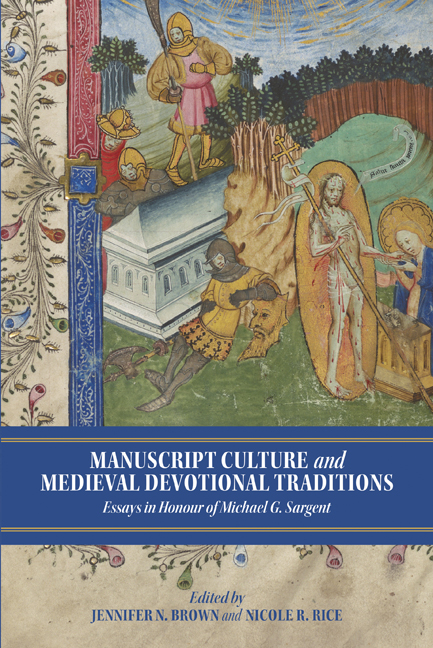Book contents
- Frontmatter
- Dedication
- Contntes
- List of Illustrations
- Acknowledgements
- List of Abbreviations
- Michael Sargent: An Appreciation
- I Manuscript Transmission and Textual Adaptation
- II Translated Texts and Devotional Implications
- III Rhetorical Strategies and Spiritual Transformations
- IV Texts and Contours of Religious Life
- Bibliography
- List of Contributors
- Michael G. Sargent’s Publications
- Index
- Tabula Gratulatoria
- York Manuscript and Early Print Studies
7 - Reflecting English Lay Piety in the Mirrors of Oxford, Bodleian Library MS e Museo 35
Published online by Cambridge University Press: 24 March 2021
- Frontmatter
- Dedication
- Contntes
- List of Illustrations
- Acknowledgements
- List of Abbreviations
- Michael Sargent: An Appreciation
- I Manuscript Transmission and Textual Adaptation
- II Translated Texts and Devotional Implications
- III Rhetorical Strategies and Spiritual Transformations
- IV Texts and Contours of Religious Life
- Bibliography
- List of Contributors
- Michael G. Sargent’s Publications
- Index
- Tabula Gratulatoria
- York Manuscript and Early Print Studies
Summary
In the introduction to his landmark 2005 critical edition of Nicholas Love's Mirror of the Blessed Life of Jesus Christ, Michael Sargent noted that ‘we simply have not yet done enough exploration of fifteenth-century vernacular theological literature’. Indeed, while the study of religious writing in English became a popular area of study in the late twentieth century, the vast majority of scholarship on such works focused largely on its position in relation to the intellectual and theological debate between fifteenth-century ecclesiastical authorities and Oxford theologian John Wycliff and his followers. This conflict has provided the contextual background for the study of the composition and circulation of much of the theological literature produced in the late fourteenth and early fifteenth centuries. However, as is now becoming increasingly apparent, even if this conflict was as influential on the composition of religious writing during this period as scholars often posit, the circulation and copying of such texts by individual fifteenth-century readers suggest that the textual cultures of the era were in fact much more complex and flexible.
While a macro analysis of trends in English religious writing at the turn of the fifteenth century often focuses on the inherent tensions between such cultural landmarks as the 1401 Oxford Translation Debate and Archbishop Thomas Arundel's infamous 1409 ‘Constitutions’, famously explored in Nicholas Watson's hugely influential 1995 Speculum article, ‘Censorship and Cultural Change in Late-Medieval England’ – as well as their great textual champions, the Wycliffite Bible and Nicholas Love's Mirror of the Blessed Life of Jesus Christ – a micro analysis of the circulation of individual texts copied in the period seems to suggest a pattern of praxis which Stephen Kelly and Ryan Perry have dubbed ‘devotional cosmopolitanism’: a practice in which supposedly ‘orthodox’ and ‘heterodox’ texts sit side by side with one another in theological and devotional miscellanies.
The methodological framework which shed light on such patterns in Kelly and Perry's work, and which informed much of the findings of this author's previous writing on Nicholas Love's Mirror, was developed as part of the Arts and Humanities Research Council-funded Geographies of Orthodoxy research project hosted by Queen's University Belfast and the University of St Andrews, which sought to build on works such as Sargent's critical edition of Love's Mirror.
- Type
- Chapter
- Information
- Manuscript Culture and Medieval Devotional TraditionsEssays in Honour of Michael G. Sargent, pp. 152 - 176Publisher: Boydell & BrewerPrint publication year: 2021



